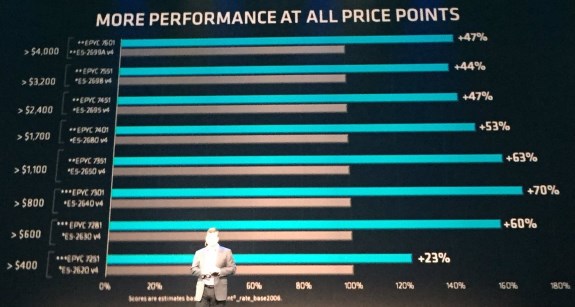
AMD (NASDAQ: AMD), and a global ecosystem of server partners, today marked a new era in the datacenter with the launch of AMD EPYC™ 7000 series high-performance datacenter processors. AMD was joined by multiple customers and partners at the global launch event in presenting a wide array of systems, performance demonstrations, and customer testimonials. The innovative, record-setting AMD EPYC design, with up to 32 high-performance “Zen” cores and an unparalleled feature set, delivers greater performance than the competition across a full range of integer, floating point, memory bandwidth, and I/O benchmarks and workloads.
“With our EPYC family of processors, AMD is delivering industry-leading performance on critical enterprise, cloud, and machine intelligence workloads,” said Lisa Su, president and CEO, AMD. “EPYC processors offer uncompromising performance for single-socket systems while scaling dual-socket server performance to new heights, outperforming the competition at every price point. We are proud to bring choice and innovation back to the datacenter with the strong support of our global ecosystem partners.”
The world’s largest server manufacturers introduced products based on AMD EPYC 7000-series processors at today’s launch, including HPE, Dell, Asus, Gigabyte, Inventec, Lenovo, Sugon, Supermicro, Tyan, and Wistron. Primary hypervisor and server operating system providers Microsoft, Red Hat, and VMware showcased optimized support for EPYC, while key server hardware ecosystem partners Mellanox, Samsung Electronics, and Xilinx were also featured in EPYC-optimized platforms.

For an in-depth look at what's new, check out this article from AnandTech.
EPYC specifications:
| Model | Core / Thread | Base Freq. | Max Boost | TDP |
|---|---|---|---|---|
| EPYC™ 7601 | 32 / 64 | 2.2 GHz | 3.2 GHz | 180W |
| EPYC™ 7551P | 32 / 64 | 2.0 GHz | 3.0 GHz | 180W |
| EPYC™ 7501 | 32 / 64 | 2.0 GHz | 3.0 GHz | 155/170W |
| EPYC™ 7451 | 24 / 48 | 2.3 GHz | 3.2 GHz | 180W |
| EPYC™ 7401P | 24 / 48 | 2.0 GHz | 3.0 GHz | 155/170W |
| EPYC™ 7351P | 16 / 32 | 2.4 GHz | 2.9 GHz | 155/170W |
| EPYC™ 7301 | 16 / 32 | 2.2 GHz | 2.7 GHz | 155/170W |
| EPYC™ 7281 | 16 / 32 | 2.1 GHz | 2.7 GHz | 155/170W |
| EPYC™ 7251 | 8 / 16 | 2.1 GHz | 2.9 GHz | 120W |